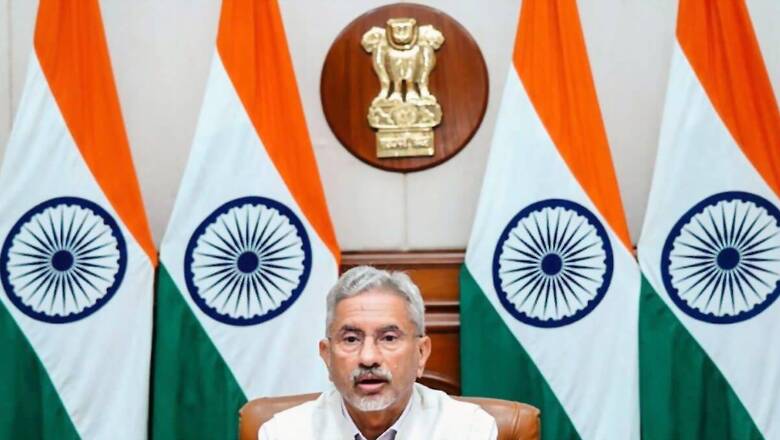
views
For the first time in nine years, India’s External Affairs Minister is visiting Pakistan. However, Dr S Jaishankar’s visit to Pakistan has nothing to do with the terror-sponsoring nation itself. Instead, India’s sole priority at this year’s SCO summit is to actively engage with all other member nations of the bloc – especially those in Central Asia. While Pakistan is a non-entity for India, the Shanghai Cooperation Organisation (SCO) is not. It is the world’s largest regional organisation, covering 80 per cent of Eurasia’s landmass, 42 per cent of the global population, and 32 per cent of the global GDP in purchasing power parity (PPP) terms.
For India, forsaking the SCO simply due to Pakistan’s presence at the forum is not a tenable option. For one, it would open the doors for China to exert undue influence over SCO, without any necessary checks and balances. Second, if New Delhi chooses to dump SCO, it could very well be weaponised by the likes of China and Pakistan to run an anti-India campaign. Besides, India is not of the view that it should have to step away from a multilateral organisation only because Pakistan remains an eyesore in it.
India appears to have devised a mature and farsighted approach to deal with forums like the SCO. While India is participating at the summit in Pakistan, it is noteworthy that Prime Minister Narendra Modi has chosen to keep himself away, instead delegating the responsibility to Dr S Jaishankar. Under normal circumstances, and if Pakistan was not hosting, it would be safe to assume that Prime Minister Modi would lead an Indian delegation to the summit.
Jaishankar laid out India’s approach in a very clear fashion recently. Ahead of his visit to Pakistan, the Indian foreign minister remarked, “I am not going there to discuss India-Pakistan relations. I am going there to be a good member of the SCO, but you know, since I am a courteous and civil person, I will behave myself."
INDUS WATER TREATY: INDIA HITS PAKISTAN WHERE IT HURTS THE MOST
Ahead of Jaishankar’s visit to Pakistan being announced, an extremely important step was taken by the Indian government. Some time in September, India officially served Pakistan a notice. For what, you may ask?
The notice seeks a review and modification of the 1960 agreement, which the Indian government now believes was unreasonably benevolent towards Pakistan. This is not the first time India has raised the issue of the Indus Water Treaty with Pakistan. Earlier, in 2023, India served a notice to Pakistan over its stubbornness to not take the review of the treaty seriously.
The recent notice, however, is much more loaded. India has now highlighted demographic and population changes, agricultural and irrigational requirements, need for clean energy sources and Pakistan’s use of terrorism as a foreign policy tool to push for a modification of the Indus Water Treaty. India is steadily doubling down on its desire to review, and if need be, fundamentally alter the contours of the Indus Water Treaty. By doing so, India has demonstrated that it can choke Pakistan’s lifeline at any time it deems fit.
In the corridors of power, the growing view on the water-sharing treaty is that it has been detrimental to Indian interests for decades, while being overly accommodative of Pakistan. This, despite the fact that Pakistan has used all the resources at its disposal to bleed India using terrorism and proxy warfare. It must be mentioned here that the treaty accorded more than 80 per cent of the total resources in the Indus River Basin to Pakistan, apart from financial aid to build infrastructure on western Punjab’s rivers.
Despite the Indus Water Treaty being disproportionately favourable towards Pakistan, the country faces an acute water crisis. It is estimated that over 80 per cent of the water supplied in Pakistan is unsafe, even as water scarcity is resulting in a loss of up to 1.5 percent of the country’s GDP.
If India were to modify the Indus Water Treaty to ensure proportionate division of resources, Pakistan could end up in some real trouble. Worse still, if Pakistan continues playing hardball on the question of modifying the treaty, India could easily junk the agreement altogether – which would push the Islamic Republic into an unprecedented crisis. Suffice to say, India has made it clear that it has its fingers on Pakistan’s lifeline.
I consider this to be a demonstration of the carrot and stick policy India is pursuing in its dealings – however limited they may be – with Pakistan. How hard India hits Pakistan here on depends entirely on Islamabad’s future actions. Already on notice from India, if Pakistan continues pushing terror into our soil, New Delhi holds the cards to make life for the Islamic nation extremely difficult. The fact that this subtle message was delivered ahead of the SCO summit in Pakistan has not been lost on anybody.
If Pakistan thought it had an opportunity to engage with India at a high-level during the SCO summit, those dreams have been dashed upfront. While the carrot is Jaishankar’s presence in Pakistan, the stick is India’s demand for a review of the Indus Water Treaty. Interestingly, Jaishankar’s visit to Pakistan also comes in the backdrop of India taking Islamabad to the cleaners at the United Nations. This year, India firmly stated that Pakistan’s continued support for cross-border terrorism will “inevitably invite consequences."
India’s approach to the SCO summit demonstrates a calculated mix of diplomacy and pressure—balancing engagement with strategic assertiveness. While Dr S Jaishankar’s visit to Pakistan may seem like an olive branch, it is far from a signal of reconciliation. India has made it clear that its participation in the SCO is not about Pakistan but about safeguarding its interests within the SCO. Simultaneously, New Delhi has sent a sharp message with its demand to review the Indus Water Treaty, signaling its readiness to hit Pakistan where it hurts if Islamabad continues its hostile actions.
The signs are clear: bilateral engagement with Pakistan remains off the table for the foreseeable future.




















Comments
0 comment